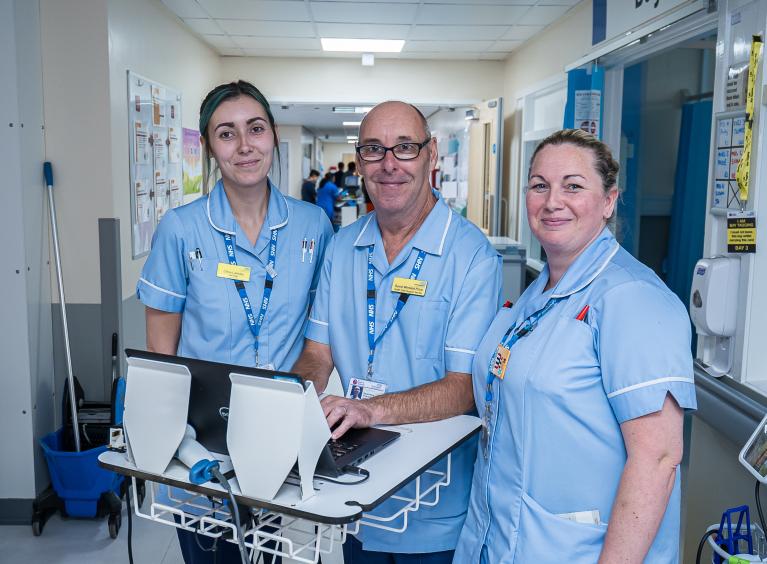Care Support Workers
The Trust regularly recruits Care Support Workers (Band 2) and Healthcare Support Workers (Band 3) across the hospital and community teams.
Find out more about these roles and how to apply.

Care Support Worker (Band 2)
Care support workers (CSWs) work in both hospital and community settings under the guidance of a registered healthcare professional. This is usually a Registered Nurse, Midwife or Allied Healthcare Professional (AHP).
The role can be varied depending upon the setting, which could be on wards, critical care, outpatient clinics, theatres, in the community including patients’ own homes.
The role includes:
- Communication – talking to patients and families, ensuring patient sensitive information is communicated confidentially and clearly to relevant colleagues.
- Privacy and dignity – making sure patients have their modesty protected during personal care, such as washing, dressing, mobilising and assisting people to the toilet.
- Fluids and nutrition – supporting patients to eat and drink according to dietary requirements.
- Awareness of mental health, dementia and learning disability – caring and communicating with people who require a level of enhanced care to support their safety, which may include one to one direct care, and distraction and de-escalation techniques.
- Safeguarding children and adults – to ensure safeguarding principles are applied to maintaining safety of children and vulnerable adults and report and disclosures.
- Basic life support – you may be required to assist with basic life support for any patient who has a cardiac arrest while in hospital care.
- End of life care – you will be in the privileged position of providing essential care or patients and those important to them at the end of their life.
What qualifications do I need to become a Care Support Worker?
You don’t have to have formal qualifications but you much be willing to undertake the Care Certificate.
Healthcare Support Worker (Band 3)
Healthcare support workers (HCSWs) work in both hospital and community settings under the guidance of a registered healthcare professional. This is usually a Registered Nurse, Midwife or Allied Healthcare Professional (AHP).
The role can be varied depending upon the setting, which could be on wards, critical care, outpatient clinics, theatres, in the community including patients’ own homes.
Healthcare Support Workers will perform everything the Care Support Worker does, as well as skills such as:
- Basic clinical observations i.e. heart rate
- Blood glucose recordings
- Urinalysis testing
- Lying and standing blood pressure monitoring
- Fluid balance recording
- 25-point skin check
- Application of a dressing under the direction of, and specified by, a registered nurse. Exceptions are dressings to category 3 or 4 pressure ulcers, compression dressing, negative pressure vac dressings.
- Bladder scanning
- Removal of sutures
- Venepuncture
- Cannulation
- Self-retaining catheter (SRC) removal
- Electrocardiogram (ECG) monitoring.
Care Support Worker Academy
Our Care Support Worker academy gives all our new Care Support Workers the opportunity to develop and practice new skills and knowledge before working in the Trust’s clinical areas.
You will spend time in a classroom environment as well as practicing what you learn in safe, patient bedded areas with a life-sized mannequin and many items of clinical equipment that you will see and use in your working environment.
During the five day programme sessions include:
- Harm-free care
- Infection prevention and control
- Tissue viability and hospital acquired pressure ulcers
- Falls prevention and risks of deconditioning
- Bed bath – hoisting, terminal bed space clean
- Making a hospital bed
- Palliative and end of life care
- Chaplaincy – role, support for patients and staff, how to support our patients’ spirituality and religious needs
- Nutrition and hydration - impact for patients, support and dietary requirements
- Reporting concerns through Freedom To Speak Up
- Uniform, dress and appearance
- Diabetes - understanding signs, symptoms
- Privacy, dignity and respect
- Learning disabilities and Autism
- Sensory impairment
- Pain management
- Mental health awareness
- Dysphasia SALT/thickener requirements – theory and practical
- Deep vein thrombosis
- Acute kidney injury
- Health and wellbeing
- Awards and recognition
- National Care Support Worker day
This provides you with the knowledge and skills to support your practice. It also provides the Trust with assurances that you have met the minimum levels required in terms of knowledge and the ability to deliver safe and compassionate care that meets the needs of patients and their families.
What is the recruitment process?
We advertise and interview every two months. Posts are advertised on NHS Jobs and the interview dates are included with each advert. Please make sure you check this date before applying as we cannot offer an alternative.
You can book on to one of our popular Care Support Worker taster sessions through the links shared on our website and social media channels.
All of our posts are included in a single advert. This means you only have to attend for one interview but this gives you access to all the posts available on the day.
When you attend for the interview you will be given a list of all wards and departments that are recruiting that day. You will be asked to select up to three areas of interest.
If successful at interview, we will always try and offer you your first choice of post. However, if that’s not possible we would then look at your second and third choice.
If successful we will always offer you a specific post. If there are no posts available that match your requirements, your application will go into a pool to await a suitable post for up to three months.
You will also be asked if you would like full or part time work, and if part time, how many hours you would be interested in.
Some areas offer team rostering where you can be part of a team planning their own roster. If you have any flexible working needs, please let us know at interview.
